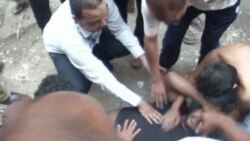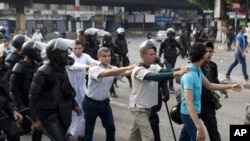CAIRO —
Egyptian security forces clashed with anti-government protesters Sunday as the nation marked the 40th anniversary of the 1973 Arab-Israeli war. At least 50 people have been killed, over 200 wounded, and more than 300 arrested in the clashes.
The military-backed government had hoped to highlight popular support during the national holiday, calling for rallies festooned with flags and the ubiquitous posters of de facto leader General Abdel Fatah el Sissi.
But the general's opponents came out in force, too.
Riot police fired tear gas in Cairo as anti-government protesters tried to converge on Tahrir Square. Some demonstrators are reported to have leapt into the Nile to escape security forces.
Egypt's Muslim Brotherhood organized marches across the nation under the banner “Reject the Coup.” While security forces were reported to be trying to keep pro- and anti-Sissi groups apart in some areas, clashes were reported in cities up and down the Nile valley and to the east, along the Suez Canal.
Prime Minister Hazem el-Beblawi, celebrating the holiday, acknowledged the tensions of the past months, but gave an account at odds with the unfolding scene.
He said that with the help of the police, army and the support of the people, security had been largely restored. The prime minister also asserted that the efforts of those he referred to as “malicious elements” were losing strength.
Sunday's protests appeared to be the biggest turnout since the mid-August crackdown on supporters of ousted president Mohamed Morsi. In the ensuing months, the protest movement has changed focus from a drive to reinstate the Islamist president to a wider anti-military stance.
Officials warned ahead of Sunday's rallies that any protesters would be considered “foreign agents.” The Muslim Brotherhood, once again facing legal bans, originated in Egypt, but anti-foreign sentiment has been running high.
Yet in a turn around in one high-profile case against foreigners, authorities Saturday released two Canadians who had been passing through Egypt when detained in the mid-August crackdown. Physician Tarek Loubani and filmmaker John Greyson had recently detailed what they described as the brutal conditions of their confinement.
The military-backed government had hoped to highlight popular support during the national holiday, calling for rallies festooned with flags and the ubiquitous posters of de facto leader General Abdel Fatah el Sissi.
But the general's opponents came out in force, too.
Riot police fired tear gas in Cairo as anti-government protesters tried to converge on Tahrir Square. Some demonstrators are reported to have leapt into the Nile to escape security forces.
Egypt's Muslim Brotherhood organized marches across the nation under the banner “Reject the Coup.” While security forces were reported to be trying to keep pro- and anti-Sissi groups apart in some areas, clashes were reported in cities up and down the Nile valley and to the east, along the Suez Canal.
Prime Minister Hazem el-Beblawi, celebrating the holiday, acknowledged the tensions of the past months, but gave an account at odds with the unfolding scene.
He said that with the help of the police, army and the support of the people, security had been largely restored. The prime minister also asserted that the efforts of those he referred to as “malicious elements” were losing strength.
Sunday's protests appeared to be the biggest turnout since the mid-August crackdown on supporters of ousted president Mohamed Morsi. In the ensuing months, the protest movement has changed focus from a drive to reinstate the Islamist president to a wider anti-military stance.
Officials warned ahead of Sunday's rallies that any protesters would be considered “foreign agents.” The Muslim Brotherhood, once again facing legal bans, originated in Egypt, but anti-foreign sentiment has been running high.
Yet in a turn around in one high-profile case against foreigners, authorities Saturday released two Canadians who had been passing through Egypt when detained in the mid-August crackdown. Physician Tarek Loubani and filmmaker John Greyson had recently detailed what they described as the brutal conditions of their confinement.






